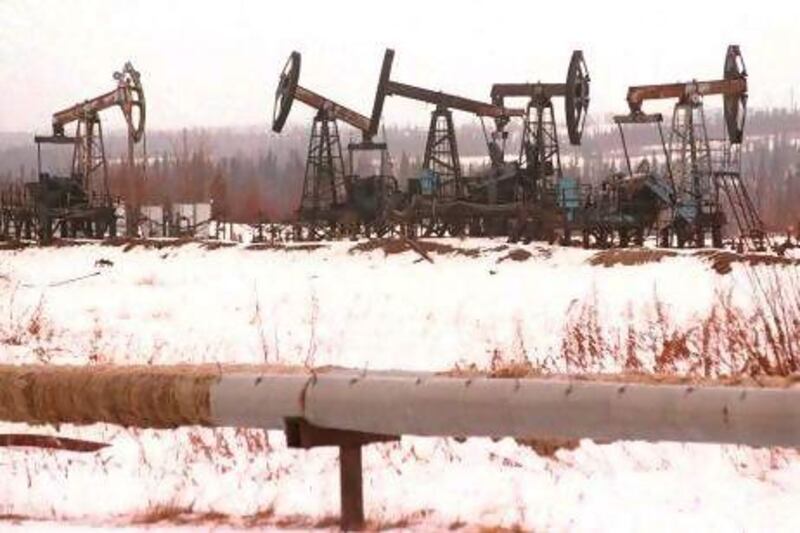The Kremlin is now in Washington," observed Heidar Aliyev, the former Azerbaijan president to his foreign policy adviser. The consummate Soviet insider was reflecting on the dissolution of the USSR, formalised on December 26, exactly two decades ago.
Are you the strongest link?
Business Quiz 2011 Do you have your finger on the pulse of business? Take our online contest for your chance to win brunch for two. Take the quiz
At first, it seemed that one of the defining geopolitical events of the 20th century would transform the global oil and gas industry. For the first time since the 1917 Russian Revolution, the Caspian's prodigious oil and gas resources were open to foreign investment.
The Soviet oil industry, inefficient and outdated, collapsed as the complex linkages between what had been subordinate republics were disrupted. But as wasteful state industries also shut down, oil exports from the former Soviet states actually increased - helping to keep oil prices low throughout the 1990s, a time of Middle Eastern economic malaise.
In the "Sale of the Century", the majority of Russian oil reserves passed into private hands. BP, Exxon and Shell suddenly had to contend with new rivals carved out of Soviet ministries - gas giant Gazprom, Kremlin favourite Lukoil and westernised Yukos.
A new breed of buccaneering oligarchs - the politically ambitious Mikhail Khodorkovsky, Chelsea owner Roman Abramovich and others - made themselves into billionaires and became powerful enough to secure Boris Yeltsin's re-election. Beginning as asset-strippers, by the late 1990s, they were modernising their firms, imitating western-style corporate governance and increasing production in the "West Siberian miracle".
Western companies missed out on this bonanza. They discovered that, as one executive put it, "the Russians didn't do such a bad job looking for oil, given the limits of their technology". They also found themselves unable to deal with the absence of law in the "Wild East". German Khan, a major shareholder in BP's Russian partner, described as "certifiably deranged", saw The Godfather as his manual for life, and brought a chrome-plated gun to dinner during a hunting trip with BP executives.
Nevertheless, like Napoleon lured on to Moscow, BP plunged in ever deeper. Paying US$571 million (Dh2.1 billion) for 10 per cent of Sidanco in 1997, it found itself being mulcted of assets. To resolve this situation, it merged its Russian assets with its oligarch partners to form TNK-BP in 2003, a brilliant but perilous deal, which in 2008 saw Robert Dudley, the current chief executive, run out of the country during a shareholder dispute.
The Caspian states have been more promising, but still problematic. The US-inspired construction of a pipeline from Azerbaijan through Georgia to Turkey was a geopolitical masterstroke, bringing the Caucasus into the West's strategic orbit and bypassing both Russia and Iran. Then in the shallow waters of the North Caspian, the largest oil discovery of the last 30 years was made at Kashagan.
Kazakhstan will be one of the main contributors to non-OPEC production growth over the next decade. But predictions that the Caspian would be a "new Gulf" were not borne out.
Instead of a bonanza for outside investors and consumers, the Soviet oil and gas order has been revealed as a vast monolith, at which outsiders can only slowly chip away. This is partly because of the tyranny of geography and partly because of the reassertion of Russian state power by Vladimir Putin, the prime minister. The arrest of Mikhail Khodorkovsky in 2003 was the first step in taming the oligarchs and returning Russia's oil industry to government control.
The post-Soviet transformation has been the source of many of the oil business's most colourful dramas. But the great shifts that were expected to follow - a wholesale reorientation of energy exports from Europe to China, the replacement of the Middle East as the world's petroleum hub, the sidelining of Russia - have not come to pass.
There are no permanent friends in oil geopolitics, but there are permanent interests - which have proved surprisingly durable from Leonid Brezhnev through Mikhail Gorbachev and Yeltsin to Mr Putin.
Robin M Mills is head of consulting at Manaar Energy, and author of The Myth of the Oil Crisis and Capturing Carbon
twitter: Follow our breaking business news and retweet to your followers. Follow us





